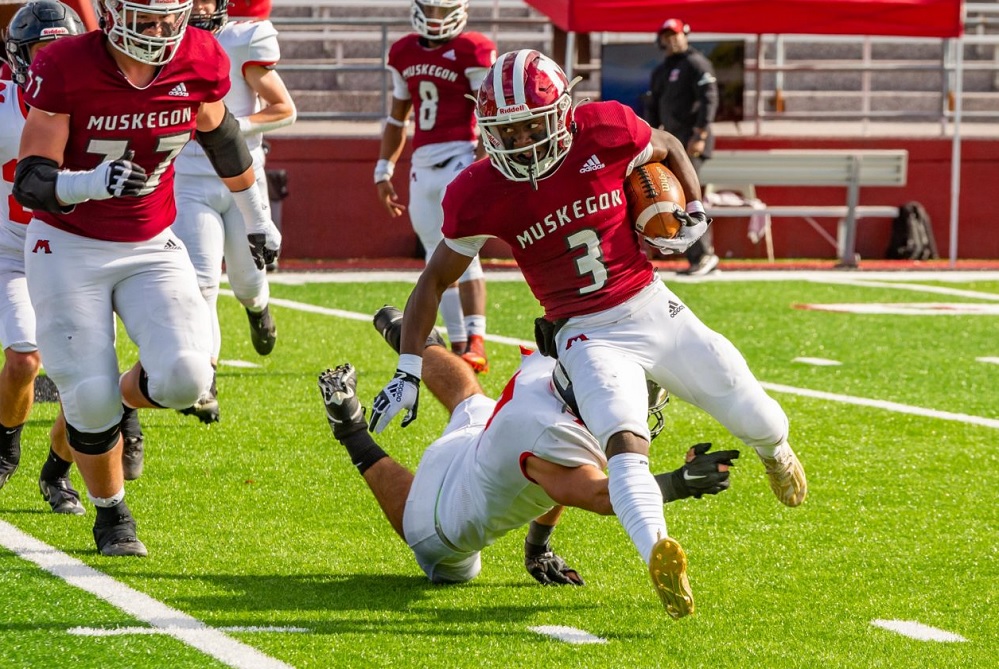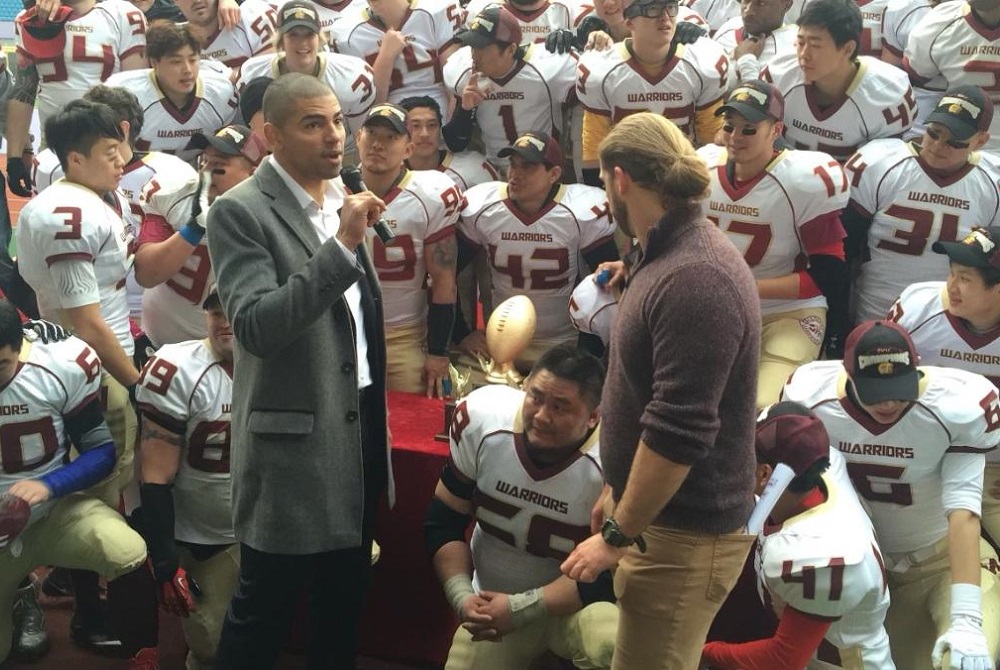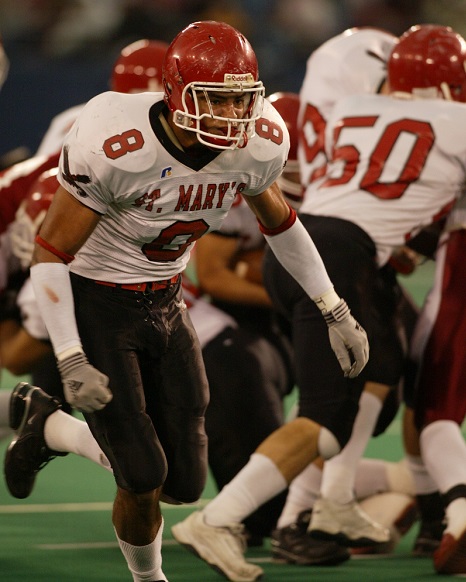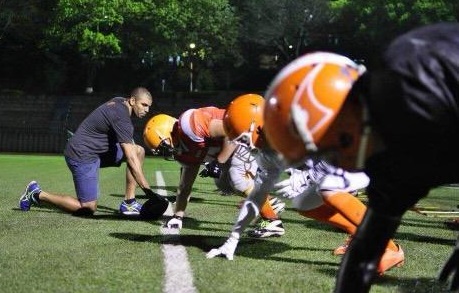
Piggee Leans on Big Reds After Dad's Death, Lifts Team with Dazzling Play
By
Tom Kendra
Special for MHSAA.com
November 3, 2021
Watching Destin Piggee do his thing on the football field – drawing collective gasps from the crowd with an array of moves, bursts of amazing speed and dramatic stops and starts – is nothing short of pure joy.
 What a contrast from the tragedy the quiet, humble, 15-year-old Muskegon High School sophomore suffered two months ago.
What a contrast from the tragedy the quiet, humble, 15-year-old Muskegon High School sophomore suffered two months ago.
Muskegon coach Shane Fairfield said his young sensation has the heart of a lion, but that heart was ripped out of his chest on the afternoon of Sept. 3 – just hours before the Big Reds hosted Detroit Cass Tech in the biggest game in the state that weekend.
Piggee learned that his previously healthy father, 43-year-old Dereko Piggee, had died from complications after a short bout with COVID-19.
He then did what his dad would have wanted that night and played for the Big Reds, ripping off a 43-yard run (appropriately, one yard for every year of his dad’s life), giving a packed house at Hackley Stadium a preview of what was to come over the next eight games.
“I played that game, but I wasn’t in my right mind,” admitted Piggee, a 5-foot-6, 160-pound slot back and return man.
“My teammates and my coaches have helped me like you wouldn’t believe. If I didn’t have football, I probably would have gone out and done something stupid.”
The next game at Zeeland West was even more challenging, as earlier that day was his father’s funeral service – and then the young man who is too young to drive a car had to lay his father and best friend to rest at the cemetery.
He responded once again, scoring the winning touchdown on a 32-yard run in the fourth quarter.
Piggee hasn’t slowed down since, rolling up 705 rushing yards on a mere 30 carries, for a staggering 24 yards per attempt, with nine touchdowns. He also has caught nine passes for 201 yards and a touchdown, giving him 17 plays of 20-plus yards on only 39 offensive touches.
 “He is a gifted natural athlete, but you should see the way this young man works,” said Muskegon coach Shane Fairfield, who has led his team to nine straight wins after the humbling Week 2 loss to Cass Tech. “His love for the game and for his teammates is contagious.”
“He is a gifted natural athlete, but you should see the way this young man works,” said Muskegon coach Shane Fairfield, who has led his team to nine straight wins after the humbling Week 2 loss to Cass Tech. “His love for the game and for his teammates is contagious.”
Muskegon (9-1) hopes to win its 10th-straight District championship at 1 p.m. Saturday when it hosts Cedar Springs (8-2).
The Big Reds, who have also won five straight Regional titles, are aspiring to make it to Ford Field for the eighth time in the past 10 years. Muskegon has won a state-best 878 games and 18 state titles, including six in the playoff era, with the latest coming in 2017.
It has been the emergence of super sophomore “smurfs” Piggee and his good friend, running back Jakob Price (5-7, 165), which has keyed this team’s resurgence.
Exhibit A was Muskegon’s 49-28 win over crosstown rival and two-time reigning Division 2 champion Muskegon Mona Shores on Oct. 8. With the Sailors keying on senior quarterback Myles Walton, the sophomores stole the show – Price with six carries for 217 yards and TD runs of 70 yards and 99 yards and Piggee with six carries for 123 yards and two TDs, along with two catches for 71 yards and another score.
Against Wyoming earlier this year, Piggee touched the ball twice all game and scored touchdowns both times, on an 82-yard run and an electrifying 50-yard punt return.
Although he makes it look easy on the field, it’s been a daily, hourly, minute-by-minute battle off of it for Piggee and his family, especially his mother, stepmother, grandparents and siblings.
“One day after school, I just started crying and I couldn’t stop,” said Piggee, who is the youngest of his father’s five children.
That was when his Big Red family stepped in.
 Senior Damari Foster hugged him and held him for a long time, before passing him off to freshman coach Corey Bibbs, who then handed him to Fairfield.
Senior Damari Foster hugged him and held him for a long time, before passing him off to freshman coach Corey Bibbs, who then handed him to Fairfield.
“Coach Fairfield finally got me to stop crying,” said Piggee, who wants to study electrical engineering in college. “He told me about some of the hard things he dealt with growing up, and I learned some things from him.”
Piggee said he draws motivation from his friend Dametrius “Meechie” Walker, a towering, 6-5 senior defensive lineman who was diagnosed last fall with osteosarcoma in his left leg, a rare bone cancer most often seen in teenage boys. The cancer has ended the playing career for Walker – who already had six Division I scholarship offers including from Michigan State, Minnesota and Kentucky – but he remains a positive, smiling force on the Muskegon sideline.
While Piggee is motivated to play hard for Walker, he is also determined to follow in the footsteps of his father, a 1996 grad who was a three-year varsity player and all-area defensive back for the Big Reds. He played running back, but was better known as a dangerous return man and lockdown cover man in the secondary.
“I remember Dereko was a nice, nice kid,” said Dave Taylor, Dereko’s head coach at Muskegon, who led the Big Reds to Class A championships in 1986 and 1989. “He did what I told him to do, and he was one of my favorites.”
This year’s Muskegon team is the youngest in Fairfield’s 12 years as head coach, with as many as eight freshmen and sophomores starting in some games.
The turning point in the season came after the 49-14 defeat at the hands of Cass Tech, when Fairfield challenged Piggee and his underclassmen teammates to rise above their youth and start playing “big boy football.”
“Big boy football means being confident and being in control of yourself at all times,” said Piggee. “We got on a group text and talked about that after our loss.
“We support our brothers here even when no one else does. These guys have helped me to get through every single day since my dad passed; you have no idea. I just want to go out and play as hard as I can for them.”
 Tom Kendra worked 23 years at The Muskegon Chronicle, including five as assistant sports editor and the final six as sports editor through 2011. E-mail him at [email protected] with story ideas for Muskegon, Oceana, Mason, Lake, Oceola, Mecosta and Newaygo counties.
Tom Kendra worked 23 years at The Muskegon Chronicle, including five as assistant sports editor and the final six as sports editor through 2011. E-mail him at [email protected] with story ideas for Muskegon, Oceana, Mason, Lake, Oceola, Mecosta and Newaygo counties.
PHOTOS (Top) Muskegon’s Destin Piggee (3) eludes the grasp of a Lowell defender during the Big Reds’ District Semifinal win Saturday. (Middle) Piggee takes the field with his teammates before the Sept. 3 game against Detroit Cass Tech. (Below) Piggee makes his move upfield against East Kentwood. (Top and below photos courtesy of Local Sports Journal. Middle photo by Tim Reilly.)

St. Mary's Standout McLaurin Becomes Chinese Football Pioneer
By
Tom Markowski
Special for Second Half
August 19, 2021
The eight years Chris McLaurin spent in China not only changed his life, but they changed the perception of American football in China and elsewhere – and just may have opened the door to a whole new market.
 We're talking “American football,” not soccer. Most of us are familiar with NFL Europe, but NFL China? Not so much.
We're talking “American football,” not soccer. Most of us are familiar with NFL Europe, but NFL China? Not so much.
When McLaurin went to China in 2011, the thought of teaching the locals American football never occurred to him. He went there to work for a private company, and circumstances just seemed to fall in place.
Some might say McLaurin was in the right place at the right time, but it can also be said he was the right person at the right time to lead this undertaking. McLaurin had the background, both athletically and organizationally, to take on such an endeavor.
“I met a lot of people who were interested in football,” McLaurin said. “I thought, football? I had a limited understanding of what they knew. I was very surprised they would reach out to me. I quickly found out they were hungry to learn.”
A 2005 graduate of Orchard Lake St. Mary's, McLaurin started at tight end and linebacker, and helped the Eaglets reach the MHSAA Division 2 Final in 2004 (where they lost to Muskegon). McLaurin went on to play four seasons at Michigan and graduated in 2009 with a degree in history and minor in urban and community studies. He had thoughts of entering law school when other opportunities interceded.
During his time in Ann Arbor, McLaurin worked with an organization that focused on disadvantaged youth in the area and helped open doors for them. They were allowed to attend lectures at the university as well as sporting events.
Upon graduation, the seeds that would blossom in Asia began being sown in other parts of the world.
McLaurin received a Fulbright Scholarship and went to Johannesburg, South Africa, to work with underprivileged youth as part of a program called Tomorrow Trust. During this time he worked with the United Nations Development Programme and Harvard Law School in their pursuit of promoting economic rights for the poor.
Following his work in South Africa, McLaurin began his post-graduate work at the London School of Economics. He earned his degree after working in the House of Commons and as a research assistant for the Runnymede Trust. Then came a six-month internship within the Obama Administration as part of the White House Domestic Policy Council.
And after that, he was off to Chongqing in western China to work for a private equity company as a project manager. Two years later, he started his own company in addition to a non-profit organization. Much of his work centered on the automobile industry and global technology.
During this time he learned to speak Mandarin and, in doing so, was introduced to more of the local customs – including American football.
 What McLaurin found was a rudimental brand of football, what we would term a recreational type of competition. McLaurin began his involvement gradually, on weekends.
What McLaurin found was a rudimental brand of football, what we would term a recreational type of competition. McLaurin began his involvement gradually, on weekends.
“After that first year (2012), I took it up a notch,” McLaurin said. “We started recruiting players and bought new equipment. They watched football on TV, but it's not an easy game to understand. You have to play football to learn it. You don't get that from watching TV.”
A year of training, recruiting and, yes, some frustration, led McLaurin to start a league, the American Football League of China (now known as the China National Football League). The rules are similar to those at the U.S. college level. There are 11 players a side, and when a ball carrier's knee touches the ground the play is over.
In the beginning “it was successful,” he said. “There were no leagues when I got there. There was no one to organize it. We went from (fewer than) 10 teams to, 3-to-4 years later, there are 80-90.”
McLaurin quickly learned he needed help if this adventure was to succeed. USA Football had a footprint in Shanghai, and McLaurin reached out to the organization. McLaurin contacted a handful of former teammates including Prescott Burgess and Morgan Trent for advice. Former NFL player Bruce Plummer and NFL coach and scout Jerry Hardaway worked some of the camps and clinics with McLaurin and added much-needed experience and expertise.
After playing at Southern Illinois, Hardaway’s first coaching position was at Memphis State as an assistant, and then he went to Grambling State to coach under the legendary Eddie Robison for six seasons. He also coached at the University of California under Joe Kapp prior to working in the NFL and then heading to China.
“I was told, through another guy, that (McLaurin) needed some help,” Hardaway said. “It was all about getting back to basics. That's what made it fun. They had no clue when you'd say to them, control the ground at impact when you're making a block. They had no idea of the terms that you'd use. To see the young kids, to see on their faces, they were absorbing everything.
 “Yes, yes, yes, it was worthwhile. First of all, people had no clue about what it takes to do something like this. They were learning. Some of the parents thought it was a violent sport. That's what they heard. Then they switched. They saw me, us, teach the basics and they saw what we were doing. For me, it gave me a sense, like hey, you have to teach and you have to enjoy it.”
“Yes, yes, yes, it was worthwhile. First of all, people had no clue about what it takes to do something like this. They were learning. Some of the parents thought it was a violent sport. That's what they heard. Then they switched. They saw me, us, teach the basics and they saw what we were doing. For me, it gave me a sense, like hey, you have to teach and you have to enjoy it.”
Soon after that first season, the NFL got involved as did the National Committee on United States - China Relations. McLaurin credits the NFL for advising him on the business end of starting a new league and structuring. After 18 months, McLaurin got out of coaching and became the commissioner.
“(The NFL) wanted to expand,” he said. “They saw how their brand was quite low (in China). China is a natural.”
Progress was slow, but it was still progress. The 2015 championship game was played in Shanghai, and McLaurin estimates it drew 3,500 spectators.
He continued to work with the AFLC through 2019 but then decided to make a career move. He returned to the U.S. and, this fall, is pursuing a dream he's held since leaving U-M. At age 34, McLaurin entered Harvard Law School.
“When I started, the last thing we wanted was a U.S. version of football,” he said. “We wanted it to be Chinese football. There were limitations on how many foreigners would compete. At first it was five (per team), then three. We wanted it to be a Chinese experience."
2020-21 Made in Michigan
August 5: Herremans' Focus on 'Dadding,' Giving Kids Similar Small-Town Childhood - Read
July 29: Loy Norrix Career Prepped Crocker for U-M Success, Law Degree Pursuit - Read
July 19: Top PGA Pro Finish Latest Greatest Highlight as Cook Continues Climb - Read
July 16: TC West Standout Renews Ties to Titans, Cheers Past Teammates' Gold Pursuit - Read
July 8: Caro Champs Find Common Ground Again as Mental Health Providers - Read
June 28: Michigan's Minor Leaguers Making Up for Lost Season - Read
PHOTOS: (Top) Former Orchard Lake St. Mary's standout Chris McLaurin started an American football league in China and remained part of its leadership through 2019. (Middle) McLaurin was a two-way starter for St. Mary's 2004 Division 2 runner-up team. (Below) McLaurin runs drills for one of the Chinese teams. (Top and below photos courtesy of Chris McLaurin; middle photo from MHSAA archives.)

